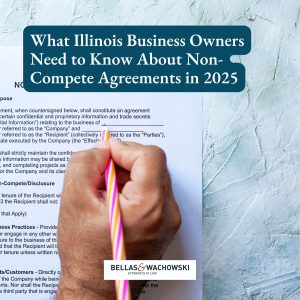 The Federal Trade Commission (FTC) tried to ban non-compete agreements across the country. That sweeping ban is now effectively dead. A federal judge struck it down, and the FTC recently gave up its appeals.
The Federal Trade Commission (FTC) tried to ban non-compete agreements across the country. That sweeping ban is now effectively dead. A federal judge struck it down, and the FTC recently gave up its appeals.
But that doesn’t mean employers are free to use non-competes however they like. The FTC has made clear that it will still go after what it sees as “anticompetitive” non-competes on a case-by-case basis. And here in Illinois, state law continues to strictly regulate how and when non-competes can be used.
For business owners, the message is simple: non-competes are not gone, but they’re under a microscope.
What Happened at the Federal Level
- The big ban is gone. In April 2024, the FTC issued its Non-Compete Clause Rule (16 C.F.R. Part 910), which would have banned most non-competes nationwide.
- In August 2024, a federal judge in Ryan, LLC v. FTC, No. 3:24-cv-986 (N.D. Tex. Aug. 20, 2024), vacated the Rule nationwide, holding that the FTC exceeded its authority.
- In September 2025, the FTC formally withdrew its appeals and “acceded to vacatur.” The Rule is dead.
- But not all risk is gone. The FTC has said it will continue to challenge non-competes under its authority in the FTC Act, 15 U.S.C. § 45, which prohibits “unfair methods of competition.”
Translation: There is no federal ban, but the FTC could still step in if your agreements are overly broad or look like they’re being used to stifle competition.
Illinois Law Still Sets the Rules
Even without the FTC’s rule, Illinois has its own strict standards. In 2021, Illinois passed Public Act 102-0358, which amended the Illinois Freedom to Work Act (820 ILCS 90).
- Key points: Income thresholds matter
- Non-competes are prohibited for employees earning less than
$75,000/year (820 ILCS 90/10(a)). - Non-solicitation agreements are prohibited for employees earning less than $45,000/year (820 ILCS 90/10(b)).
- These thresholds increase every five years until 2037.
- Adequate consideration. To be enforceable, a restrictive covenant must be supported by “adequate consideration.” Illinois courts interpret this to mean at least two years of continued employment or other sufficient professional or financial benefits (820 ILCS 90/5).
- Process counts. Employers must:
- Give employees 14 calendar days to review the agreement (820 ILCS 90/20(b)); and
- Provide a written notice advising them to consult with an attorney (820 ILCS 90/20(a)).
- Reasonableness and legitimate interest. A covenant is enforceable only if:
- It is no greater than required to protect a legitimate business interest;
- It does not impose undue hardship on the employee; and
- It is not injurious to the public (820 ILCS 90/7).
- Courts consider factors like duration, geographic scope, and the employee’s role.
What Illinois Employers Should Do Now
- Review your current agreements. Confirm they comply with the Illinois
Freedom to Work Act (820 ILCS 90), especially income thresholds and
procedural requirements. - Narrow the scope. Courts will not enforce overly broad restrictions. Keep time,
geography, and scope focused only on protecting trade secrets, confidential
information, or customer goodwill. - Consider alternatives. Confidentiality and non-solicitation agreements often
provide strong protection without the higher risk of non-compete clauses. - Stay alert to federal enforcement. The FTC can still challenge agreements it
deems “anticompetitive” under the FTC Act, 15 U.S.C. § 45. - Work with legal counsel. Drafting restrictive covenants that meet both state and
federal scrutiny is technical. A tailored agreement today is far less costly than
litigating an unenforceable one later.
Bottom Line
For Illinois businesses, non-competes are still available, but only if they’re carefully drafted and used with the right employees.
The FTC’s nationwide ban is gone, but the agency is still watching, and Illinois law continues to enforce strict standards. If your business relies on non-competes, this is the time to audit and update your agreements to make sure they’ll hold up in court.
Key Takeaways for Illinois Business Owners
- FTC Rule (16 C.F.R. Part 910): Vacated by federal court in Ryan, LLC v. FTC; FTC dropped appeals.
- FTC Act, 15 U.S.C. § 45: Still gives FTC power to challenge “unfair” non- competes case by case.
- Illinois Freedom to Work Act (820 ILCS 90):
- Bars non-competes under $75,000/year and non-solicits under
$45,000/year. - Requires 14-day review period and attorney notice.
- Enforces only agreements that are narrow and protect legitimate business
interests.
- Bars non-competes under $75,000/year and non-solicits under
- Action item: Audit restrictive covenants now; narrow scope; consider alternatives. The experienced Chicago Business Lawyers at Bellas & Wachowski are available to counsel you and your business on employment issues.
 Chicago Business Attorney Blog
Chicago Business Attorney Blog

